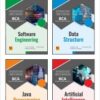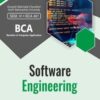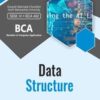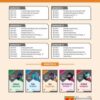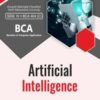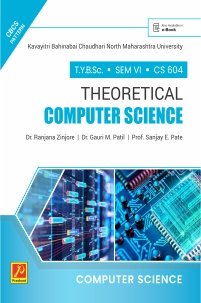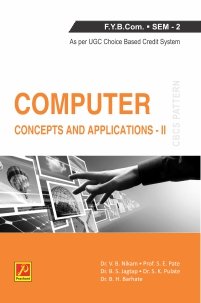BCA - COMBO SET C (SEM - IV)
BCA 401-404 (C) (Bachelor of Computer Application)
Authors:
ISBN:
₹335.00 Original price was: ₹335.00.₹300.00Current price is: ₹300.00.
- DESCRIPTION
- INDEX
Sem IV | BCA-401
Bachelor in Computer Application
Software Engineering
Sem IV | BCA-402
Bachelor in Computer Application
Data Structure
Sem IV | BCA-403
Bachelor in Computer Application
Java Programming
Sem IV | BCA-404 (C)
Bachelor in Computer Application
Artificial Intelligence
BCA 401 – Software Engineering
Chapter – 1
System Concept and Information
1.1 Definition
1.2 Characteristics of System
1.3 Elements of Systems
1.4 Types of System
Chapter – 2
System Development Life Cycle
2.1 Roles of System Analysts
2.2 What is Systems Development Life Cycle (SDLC))
2.3 SDLC Models
2.3.1 What is Waterfall Model
2.3.2 What is Spiral Model
2.3.3 What is RAD Model
2.3.4 What is Prototyping Model
Chapter – 3
System Planning
3.1 Data and Fact Gathering Techniques
3.2 Introduction to Feasibility Study
3.3 Types of feasibility study
3.4 Introduction to Software Requirement Specifications (SRS)
3.5 Need of Software Requirement Specifications (SRS)
Chapter – 4
Systems Design and Modelling
4.1 Computer Aided Software Engineering (CASE)
4.1.1 Systems Flowcharts
4.1.2 Data Flow Diagrams
4.1.3 Entity Relationship Diagram
4.2 Tools for Structured Analysis
4.2.1 Decision Tree
4.2.2 Decision Tables
4.2.3 Structured English
Chapter – 5
User Interface of System & Software Testing
5.1 User – Interface Design
5.2 Graphical Interfaces
5.3 Elements of Good Interface Design
5.4 Introduction to Software Testing
5.5 Introduction to Black-Box and White Box Testing
Chapter – 6
Designing business application system using DFD, ERD
6.1 Library Management System
6.2 Inventory Management System
6.3 Hospital Management System
6.4 Sales/Purchase System
BCA 402 – Data Structure
Chapter – 1
Introduction
1.1 Meaning of Data
1.2 Data Item
1.3 Elementary Items
1.4 Meaning of Data Structure
1.5 Linear and Non-Linear Data Structure
1.6 Meaning of Algorithm in Data Structure
1.7 Algorithm Development
Chapter – 2
Array
2.1 Definition
2.2 Representation of Array
2.3 Types of arrays
2.4 What is traversal operation in array?
2.5 Insert Operation
2.6 Delete Operation
2.7 Sorting (Bubble Sort, Selection Sort, Insertion Sort, Quick Sort, Merge Sort)
2.8 Searching (Linear Search, Binary Search)
Chapter – 3
Stack
3.1 Definition and Concepts
3.2 Definition of Stack
3.3 Representation of Stack – Static
3.4 Operations of Stack
3.5 Applications of Stack
3.6 Polish Notation or Evaluation of Postfix expression
3.7 Recursion using Stack
Chapter – 4
Queues
4.1 Introduction
4.2 Definition
4.3 Implementation / Static Representation of Queue
4.4 Operations Performed on Queue
4.5 Circular Queue
4.6 De-queue and Priority Queue
4.7 Applications of queues
Chapter – 5
Linked List
5.1 Introduction
5.2 Representation of Linked List
5.3 Operations of Linked Lists
5.4 Types of linked lists
5.5 Singly Linked List
5.6 Doubly Linked List
5.7 Circular Linked List
5.8 Circular Doubly Linked List
Chapter – 6
Trees and Graphs
6.1 Introduction to Tree
6.2 Binary Tree
6.3 Representing binary trees in memory
6.4 Traversing binary trees
6.5 Threaded Binary Tree
6.6 Graph : Types, representation in memory
6.7 Graph : Types in Memory
6.8 Graph : Representation in Memory
BCA 403 – Java Programming
Chapter – 1
Introduction to JAVA
Chapter – 2
Objects and Classes
Chapter – 3
Inheritance and Interface in JAVA
Chapter – 4
Exception handling in JAVA
Chapter – 5
User Interface using AWT and Swing
Chapter – 6
Streams and Files in JAVA
BCA 404 (C) – Artificial Intelligence
Chapter – 1
Introduction
1.1 What is Artificial Intelligence?
1.2 The AI Problems
1.3 The Underlying Assumption
1.4 What is an AI Technique
1.5 The Level of the Model
1.6 Criteria for Success
1.7 Some General References
Chapter – 2
Problems, Problem Spaces and Search
2.1 State Space
2.2 Production Systems
2.3 Problem Characteristics
2.4 Production System Characteristics
2.5 Uninformed Search Techniques
Chapter – 3
Heuristic Search Techniques
3.1 Generate-and-Test
3.2 Hill Climbing
3.3 Best-First Search
3.4 Problem Reduction
Chapter – 4
Knowledge Representation
4.1 Knowledge Representation Issues
4.2 Representations and Mappings
4.3 Approaches to knowledge Representation
4.4 Issues in Knowledge Representation
Chapter – 5
Representing Knowledge Using Rules
5.1 Predicate Logic- Representing Instance and Isa Relationships
5.2 Computable Functions and Predicates
5.3 Procedural Versus Declarative knowledge
5.4 Logic Programming
5.5 Forward versus Backward Reasoning
Chapter – 6
Fundamental Use Cases for AI
6.1 AI Use Cases
6.2 Digital Personal Assistant and Chatbots
6.3 Shipping and Warehouse Management
6.4 Human Health
6.5 Knowledge Search
6.6 Recommender Systems
6.7 The Smart Home
6.8 Gaming
6.9 Movie Making
6.10 Data Cleansing and Transformation

